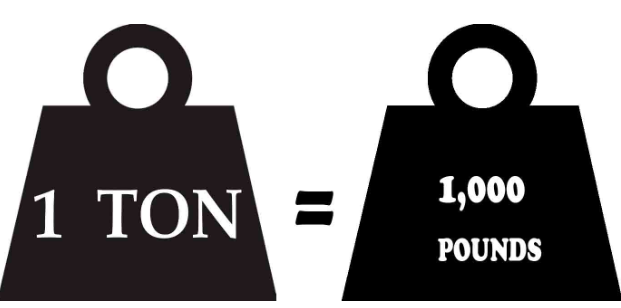When you hear the words ton and pound, you are hearing two different units of weight. But how many pounds in a ton? The answer depends on the type of ton we are talking about. In the United States, there are 2,000 pounds in a ton when we mean the “short ton.” In the United Kingdom, the long ton has 2,240 pounds. And if you use the metric system, a metric ton is about 2,204.62 pounds.
Understanding this conversion is important in daily life. From shipping goods to buying large amounts of materials, knowing how many pounds in a ton can help you avoid mistakes and save money.
Different Types of Tons
Not all tons are the same. The meaning of a “ton” changes depending on where you are and what system you use:
- Short Ton (US Ton) → 2,000 pounds (used mainly in the United States)
- Long Ton (Imperial Ton) → 2,240 pounds (used mainly in the UK before the metric system)
- Metric Ton (Tonne) → 1,000 kilograms or about 2,204.62 pounds (used worldwide in science and trade)
When converting, it’s very important to know which ton is being referred to. Using the wrong one can lead to errors in calculations, especially in industries like shipping, construction, and agriculture.
How to Convert Tons to Pounds
Converting tons to pounds is simple if you know the type of ton:
Formula:
ini
CopyEdit
Pounds = Tons × Pounds in One Ton
Examples:
- Short Ton: 3 tons × 2,000 = 6,000 pounds
- Long Ton: 3 tons × 2,240 = 6,720 pounds
- Metric Ton: 3 tons × 2,204.62 ≈ 6,613.86 pounds
By multiplying the number of tons by the pounds in one ton, you get the correct weight. This is especially useful when comparing shipping rates or measuring bulk goods.
Why Knowing Pounds in a Ton Matters
Knowing how many pounds in a ton is more than just trivia. It can affect:
- Business deals – correct weight means fair pricing.
- Construction projects – ensuring correct material orders.
- Transport and shipping – avoiding overweight charges.
- Science and engineering – accuracy in calculations.
Even in everyday life, if you are buying bulk foods, grains, or animal feed, knowing this conversion helps you make better choices.
History of the Ton and Pound
The pound comes from the ancient Roman “libra” (why we use “lb” as the symbol). Over time, different regions defined the pound in slightly different ways. The ton started as a measure of large barrels of wine called “tuns,” which weighed around 2,000 pounds.
The short ton became standard in the US, while the long ton stayed in the UK until metrication. The metric ton is now common worldwide, especially in international trade.
Common Mistakes When Converting
People often make mistakes when converting tons to pounds:
- Not checking the type of ton – mixing short, long, and metric tons.
- Rounding too early – leading to inaccurate results.
- Using ton in weight when it means volume – for example, in shipping containers or fuel.
To avoid mistakes, always confirm the unit system and double-check your math.
Practical Examples of Tons and Pounds in Real Life
- Shipping containers: A large shipping container may weigh about 4 short tons (8,000 pounds) empty.
- Cars: A small car may weigh 1.5 short tons (3,000 pounds).
- Elephants: A large African elephant can weigh up to 6 short tons (12,000 pounds).
These examples help you imagine how heavy a ton really is in pounds.
Quick Reference Conversion Table
| Type of Ton | Pounds per Ton | Example Conversion (5 Tons) |
| Short Ton | 2,000 lbs | 10,000 lbs |
| Long Ton | 2,240 lbs | 11,200 lbs |
| Metric Ton | 2,204.62 lbs | 11,023.1 lbs |
This table is a quick guide for when you need an instant answer without doing the math in your head.
Conclusion
The answer to “how many pounds in a ton” depends on the ton type. In the US, 1 ton = 2,000 pounds. In the UK, 1 ton = 2,240 pounds. In the metric system, 1 ton ≈ 2,204.62 pounds. Knowing the difference can save time, money, and confusion in daily life, business, and travel.
FAQs
Q1: How many pounds are in a short ton?
A: A short ton equals exactly 2,000 pounds.
Q2: Is a metric ton heavier than a short ton?
A: Yes, a metric ton is about 2,204.62 pounds, slightly heavier than a short ton.
Q3: Why are there different types of tons?
A: Different countries developed their own systems over time based on trade, industry, and historical standards.



